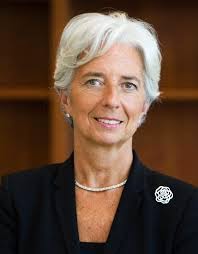Its official: the rich are getting richer
and the poor are getting poorer. The number of UK
 |
| Christine Lagarde |
The so-called Wealth Gap is hardly ever out of the news these days, since the
Credit Crunch, the Occupy Wall Street movement and Barack Obama’s re-election
campaign. So I was interested to read about the conference
on ‘Inclusive Capitalism’ which took place recently at the London Guildhall and Mansion House. It
was a glittering occasion attended by some of the richest people in the world, hosted by the Lord Mayor of London, and with keynote
speakers including HRH Prince Charles, Bank of England Governor Mark Carney,
President Bill Clinton and IMF leader Christine Lagarde.
The conference was part of the Henry
Jackson Initiative for Inclusive Capitalism, a ‘non-profit initiative working
towards a more Inclusive Capitalism’, according to its own blurb. The concept
was largely dreamed up by Lady Lynn de Rothschild: a bit ironic, you may
think, since the Rothschild family is a leading light in the world of
international finance and banking, and virtually a by word for huge wealth.
Since the financial downturn, 'capitalism' has become a bit of a dirty word, with financial fat-cats and bankers in the
City and on Wall Street taking the blame for causing the Credit Crunch with
their dubious financial dealings. The
very system that brought security and success to many in the West has brought
financial ruin and social exclusion to millions, and is now associated with greed
and corruption.
Speaking at the conference, Christine
Lagarde said
Most recently, however, capitalism has been
characterized by “excess”—in risk-taking, leverage, opacity, complexity, and
compensation. It led to massive destruction of value. It has also been
associated with high unemployment, rising social tensions, and growing
political disillusion – all of this happening in the wake of the Great
Recession.
One of the main
casualties has been trust—in leaders, in institutions, in the free-market
system itself. The most recent poll conducted by the Edelman Trust Barometer,
for example, showed that less than a fifth of those surveyed believed that
governments or business leaders would tell the truth on an important issue.
This is a wakeup
call. Trust is the lifeblood of the modern business economy. Yet, in a world
that is more networked than ever, trust is harder to earn and easier to lose.
Lady Rothschild also addressed the
conference, and proved that she does not lack a sense humour, as she admitted
that the very concept of Inclusive Capitalism sounds like an oxymoron. She also
has a highly developed social conscience and worries that the Great American
Dream of making good by enterprise, civic responsibility and sheer hard work
regardless of social background, may now be unattainable. Growing up in a modest New Jersey Columbia Law
School she went on to study
international law at the Graduate
Institute of International Studies in Geneva
I don’t want to destroy the system. I want to balance
the freedom that has brought me a wonderful life with personal responsibility.
That is the only way to save capitalism for the sake of a future generation of
girls who have dreams.
Prince Charles, in the news recently after
his controversial remarks likening President Putin to Adolf Hitler, was another
keynote speaker. Apart from that
political hot potato, and for being first in line to the English throne, he is
probably best known as a campaigner for environmental issues and as a generous sponsor
of youth opportunity through his Prince’s Trust organisation. He drew on both
of these obsessions in his address, calling for a ‘fundamental transformation
of global capitalism’ to halt ‘dangerously accelerating climate change’ and also
calling on businesses to invest in young people and give to charity.
Amen to all of those fine sentiments. I have no objection to people enjoying great wealth if they have earned it for themselves in an ethical manner (OK, I realise that criterion may exclude Prince Charles, however well-meaning as he is) especially if they have a social conscience and are responsible enough to share their good fortune with others. Capitalism has been getting a bad press in recent years, and deservedly so, what with Liborgate, the Sub-Prime mortgage crisis, PPI mis-selling and obscenely high bonuses for bankers, to name but a few. All those things are deplorable, but could we really contemplate living in a society organised along non-capitalistic lines, such as we have witnessed in Russia and China? I don't fancy it myself. We need to stick with the system we have got, but we need to clean it up. The big banks should take heed of what Christine Lagarde is saying: banking reform is an essential element in preventing a future financial crisis, but it is not happening quickly enough, the new regulations are not tough enough, and financial supervision is not tight enough. Lets do the right thing, and get on with it.

No comments:
Post a Comment